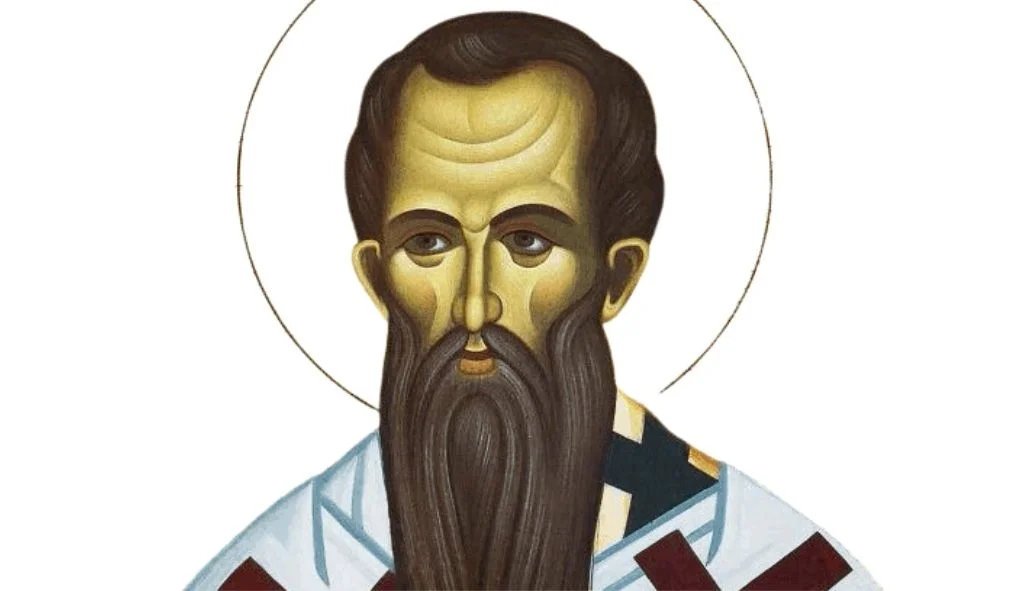St. Basil’s Feast: Traditions, Liturgy & Legacy
The Feast of St. Basil the Great is celebrated on January 1st in the Eastern Orthodox Church. It commemorates the life and works of St. Basil, a prominent 4th-century Christian theologian, bishop, and founder of monasticism in Asia Minor.
St. Basil’s Life and Legacy
Early Life and Education
St. Basil was born in 330 A.D. in Caesarea, Cappadocia, which is now part of modern-day Turkey. He came from a wealthy and pious Christian family, which greatly influenced his upbringing and future path. Basil received an excellent education, studying in Caesarea, Constantinople, and Athens. During his time in Athens, he formed a close friendship with Gregory of Nazianzus, who would later become another important figure in the Church.
Spiritual Journey and Monastic Life
After completing his studies, Basil returned to Caesarea and began a career as a teacher of rhetoric. However, he soon felt called to a deeper spiritual life. He traveled to Egypt, Palestine, and Syria to study the lives of hermits and ascetics. This experience profoundly impacted him and led to his decision to embrace monastic life.
Basil established a monastic community on his family estate in Pontus. Here, he developed guidelines for monastic life that focused on community living, liturgical prayer, and manual labor. These guidelines would later become influential in shaping Eastern Christian monasticism.
Episcopal Career and Theological Contributions
In 370, Basil was elected Bishop of Caesarea. As bishop, he was known for his care of the poor and underprivileged. He established hospitals, schools, orphanages, and homes for the elderly, collectively known as the “Vasiliada.”
Basil was also a prolific writer and a staunch defender of orthodox Christian doctrine. He played a crucial role in the fight against Arianism, a heresy that denied the divinity of Christ. His writings were particularly significant, helping to establish the doctrine of the Trinity as it is understood today.
The Feast of St. Basil
Date and Significance
The Feast of St. Basil is celebrated on January 1st in the Eastern Orthodox Church, coinciding with the New Year. This date marks the anniversary of St. Basil’s death, which occurred on January 1, 379. In the Western Church, St. Basil’s feast day is observed on January 2nd.
Liturgical Celebrations
On this day, many Orthodox churches celebrate the Divine Liturgy of St. Basil the Great. This liturgy, attributed to St. Basil, is longer and more solemn than the more commonly used Divine Liturgy of St. John Chrysostom. It is celebrated ten times throughout the year, including on St. Basil’s feast day.
The liturgical celebration typically begins on the evening of December 31st with a Great Vespers service. On the morning of January 1st, the Divine Liturgy is preceded by a Matins (Orthros) service.
Vasilopita Tradition
One of the most well-known traditions associated with the Feast of St. Basil is the baking and sharing of Vasilopita, or St. Basil’s Bread. This custom is particularly popular in Greece, Cyprus, and other areas with Greek Orthodox populations.
Vasilopita is a sweet bread or cake with a coin hidden inside. The name comes from the Greek words “Vasilios” (Basil) and “pita” (pie or bread). The tradition of baking a coin into the bread is linked to a story about St. Basil’s generosity.
According to legend, during a time of famine, the emperor demanded an excessive tax from the people of Caesarea. St. Basil intervened on behalf of his flock, convincing the emperor to return the collected valuables. To fairly distribute the returned items, St. Basil had them baked into bread, which was then miraculously distributed to their rightful owners.
On New Year’s Day, families gather to cut the Vasilopita. The bread is blessed and then cut in a specific order: the first piece is set aside for Christ, the second for the Virgin Mary, the third for St. Basil, and subsequent pieces for the poor, the household, and its members in order of age. The person who finds the hidden coin in their piece is considered blessed for the coming year.

St. Basil’s Teachings and Influence
Theological Contributions
St. Basil made significant contributions to Christian theology, particularly in the areas of Trinitarian doctrine. He played a crucial role in defining the terms “ousia” (essence/substance) and “hypostasis” (person/reality), which were essential in articulating the Church’s understanding of the Trinity.
Basil’s insistence on the divinity and consubstantiality was particularly influential. His work remains a seminal text in Eastern Orthodox pneumatology.
Monastic Rules
St. Basil’s guidelines for monastic life, known as the Basilian Rule, had a profound impact on Eastern Christian monasticism. Unlike the solitary asceticism practiced by many desert fathers, Basil emphasized communal living, balanced with periods of solitude for prayer and contemplation.
His monastic rule stressed the importance of work, study, and prayer in equal measure. This balanced approach to monastic life influenced not only Eastern monasticism but also had an impact on Western monastic traditions.
Social Teachings
St. Basil was known for his strong stance on social justice and care for the poor. He criticized the wealthy for their excesses and called for a more equitable distribution of resources. His famous quote, “The bread in your cupboard belongs to the hungry man; the coat hanging unused in your closet belongs to the man who needs it; the shoes rotting in your closet belong to the man who has no shoes; the money which you hoard up belongs to the poor,” encapsulates his views on social responsibility.
His establishment of the Vasiliada, a complex of charitable institutions, was a practical application of these principles. This “new city” of charity included a hospital, a hospice for the elderly, and a leprosarium, among other facilities.
St. Basil’s Impact on Christian Culture
Liturgical Legacy
The Divine Liturgy of St. Basil the Great remains an important part of Eastern Orthodox worship. While it is used less frequently than the Liturgy of St. John Chrysostom, it is celebrated on significant occasions throughout the liturgical year, including all Sundays of Great Lent.
In addition to the Divine Liturgy, many prayers attributed to St. Basil are still used in Eastern Christian worship. These include exorcism prayers, morning and evening prayers, and the “Prayer of the Hours” used in the Daily Office.
Educational Influence
St. Basil’s emphasis on education has had a lasting impact on Christian culture. He believed in the importance of both religious and secular learning, arguing that classical literature and philosophy could be valuable tools for Christian education when approached with discernment.
His treatise “Address to Young Men on the Right Use of Greek Literature” provides guidance on how Christians should approach pagan literature and learning. This work influenced Christian attitudes towards classical education for centuries.
Iconography and Art
St. Basil is frequently depicted in Eastern Orthodox iconography. He is typically shown as a tall, thin man with a long, dark beard, wearing bishop’s vestments. He is often portrayed holding a scroll or a book, symbolizing his role as a teacher and theologian.
In Greek tradition, St. Basil has taken on a role similar to that of Santa Claus in Western culture. He is said to visit homes on New Year’s Eve or Day, bringing gifts to children. This tradition is reflected in Greek folk art and modern cultural representations.
Contemporary Celebrations and Relevance
Modern Observances
Today, the Feast of St. Basil continues to be an important celebration in the Eastern Orthodox Church. In Greece and other Orthodox countries, it is often combined with New Year’s celebrations, creating a festive atmosphere that blends religious observance with cultural traditions.
The cutting of the Vasilopita remains a popular custom, not only in homes but also in schools, workplaces, and community organizations. Many Greek Orthodox churches hold Vasilopita cutting ceremonies as fundraisers or community-building events.
Relevance to Modern Christianity
St. Basil’s teachings on social justice and care for the poor continue to resonate with many Christians today. His emphasis on practical charity and the responsible use of wealth aligns with contemporary discussions about social responsibility and economic justice.
His balanced approach to faith and reason, as well as his integration of classical learning with Christian theology, offers a model for engaging with secular knowledge and culture from a Christian perspective.
Ecumenical Significance
St. Basil is venerated not only in Eastern Orthodox churches but also in Roman Catholic, Anglican, and Lutheran traditions. His feast day is observed in various forms across these denominations, making him a figure of ecumenical significance.
His theological work, particularly on the Trinity, continues to be studied and respected across Christian traditions. This shared reverence for St. Basil can serve as a point of connection in ecumenical dialogues.
KCCNJ Words
The Feast of St. Basil the Great is more than just a religious observance; it’s a celebration of a life dedicated to faith, learning, and service. St. Basil’s contributions to Christian theology, monastic life, and social ethics continue to influence the Church and inspire believers today.
As we celebrate this feast, we are reminded of the enduring legacy of St. Basil – his commitment to orthodox faith, his care for the poor and marginalized, and his emphasis on education and spiritual growth. Whether through the sharing of Vasilopita, the celebration of the Divine Liturgy, or reflection on his teachings, the Feast of St. Basil offers an opportunity to connect with a rich Christian tradition and to consider how its lessons might apply to our lives today.
In an age often characterized by materialism and individualism, St. Basil’s example of selfless service and community-minded faith provides a powerful counter-narrative. His feast day invites us to reflect on how we might embody these values in our own contexts, continuing the work of building a more just and compassionate world.
As we enter a new year, the Feast of St. Basil challenges us to consider how we might live out our faith with the same courage, wisdom, and compassion that characterized this great saint’s life. In doing so, we honor not just the memory of St. Basil, but the timeless principles of love, justice, and service that lie at the heart of the Christian message.







